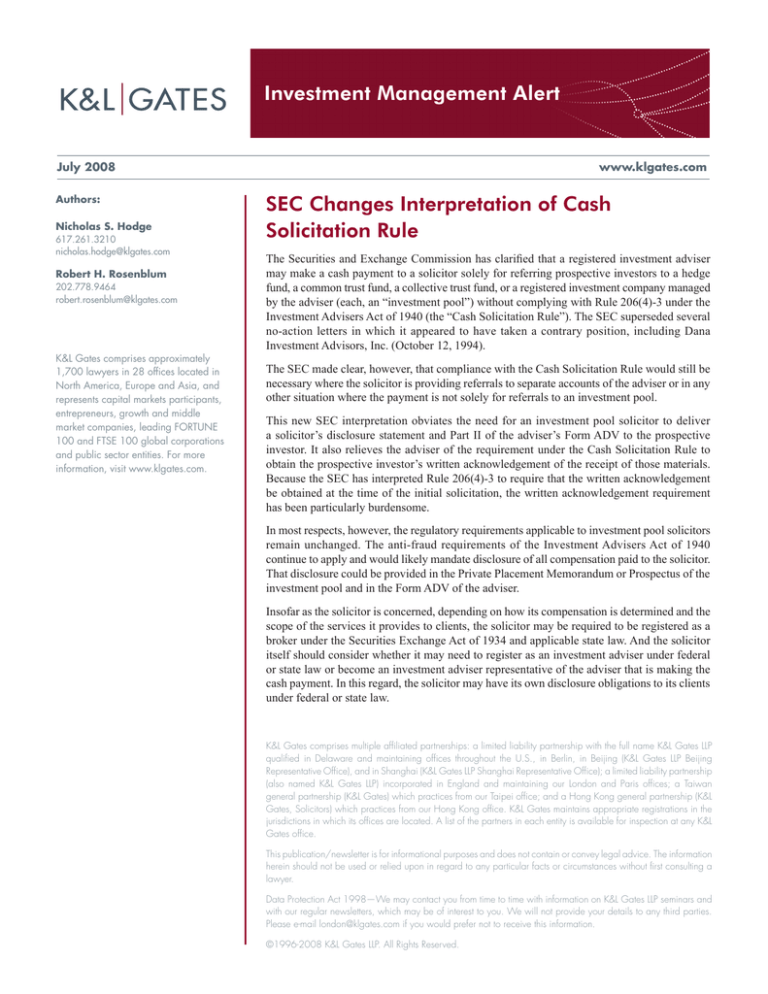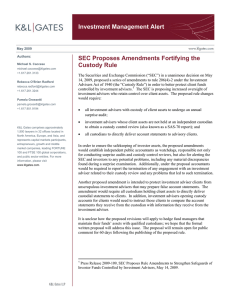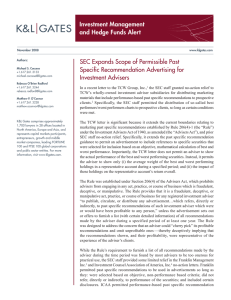
Investment Management Alert
July 2008
Authors:
Nicholas S. Hodge
617.261.3210
nicholas.hodge@klgates.com
Robert H. Rosenblum
202.778.9464
robert.rosenblum@klgates.com
K&L Gates comprises approximately
1,700 lawyers in 28 offices located in
North America, Europe and Asia, and
represents capital markets participants,
entrepreneurs, growth and middle
market companies, leading FORTUNE
100 and FTSE 100 global corporations
and public sector entities. For more
information, visit www.klgates.com.
www.klgates.com
SEC Changes Interpretation of Cash
Solicitation Rule
The Securities and Exchange Commission has clarified that a registered investment adviser
may make a cash payment to a solicitor solely for referring prospective investors to a hedge
fund, a common trust fund, a collective trust fund, or a registered investment company managed
by the adviser (each, an “investment pool”) without complying with Rule 206(4)-3 under the
Investment Advisers Act of 1940 (the “Cash Solicitation Rule”). The SEC superseded several
no-action letters in which it appeared to have taken a contrary position, including Dana
Investment Advisors, Inc. (October 12, 1994).
The SEC made clear, however, that compliance with the Cash Solicitation Rule would still be
necessary where the solicitor is providing referrals to separate accounts of the adviser or in any
other situation where the payment is not solely for referrals to an investment pool.
This new SEC interpretation obviates the need for an investment pool solicitor to deliver
a solicitor’s disclosure statement and Part II of the adviser’s Form ADV to the prospective
investor. It also relieves the adviser of the requirement under the Cash Solicitation Rule to
obtain the prospective investor’s written acknowledgement of the receipt of those materials.
Because the SEC has interpreted Rule 206(4)-3 to require that the written acknowledgement
be obtained at the time of the initial solicitation, the written acknowledgement requirement
has been particularly burdensome.
In most respects, however, the regulatory requirements applicable to investment pool solicitors
remain unchanged. The anti-fraud requirements of the Investment Advisers Act of 1940
continue to apply and would likely mandate disclosure of all compensation paid to the solicitor.
That disclosure could be provided in the Private Placement Memorandum or Prospectus of the
investment pool and in the Form ADV of the adviser.
Insofar as the solicitor is concerned, depending on how its compensation is determined and the
scope of the services it provides to clients, the solicitor may be required to be registered as a
broker under the Securities Exchange Act of 1934 and applicable state law. And the solicitor
itself should consider whether it may need to register as an investment adviser under federal
or state law or become an investment adviser representative of the adviser that is making the
cash payment. In this regard, the solicitor may have its own disclosure obligations to its clients
under federal or state law.
K&L Gates comprises multiple affiliated partnerships: a limited liability partnership with the full name K&L Gates LLP
qualified in Delaware and maintaining offices throughout the U.S., in Berlin, in Beijing (K&L Gates LLP Beijing
Representative Office), and in Shanghai (K&L Gates LLP Shanghai Representative Office); a limited liability partnership
(also named K&L Gates LLP) incorporated in England and maintaining our London and Paris offices; a Taiwan
general partnership (K&L Gates) which practices from our Taipei office; and a Hong Kong general partnership (K&L
Gates, Solicitors) which practices from our Hong Kong office. K&L Gates maintains appropriate registrations in the
jurisdictions in which its offices are located. A list of the partners in each entity is available for inspection at any K&L
Gates office.
This publication/newsletter is for informational purposes and does not contain or convey legal advice. The information
herein should not be used or relied upon in regard to any particular facts or circumstances without first consulting a
lawyer.
Data Protection Act 1998—We may contact you from time to time with information on K&L Gates LLP seminars and
with our regular newsletters, which may be of interest to you. We will not provide your details to any third parties.
Please e-mail london@klgates.com if you would prefer not to receive this information.
©1996-2008 K&L Gates LLP. All Rights Reserved.






